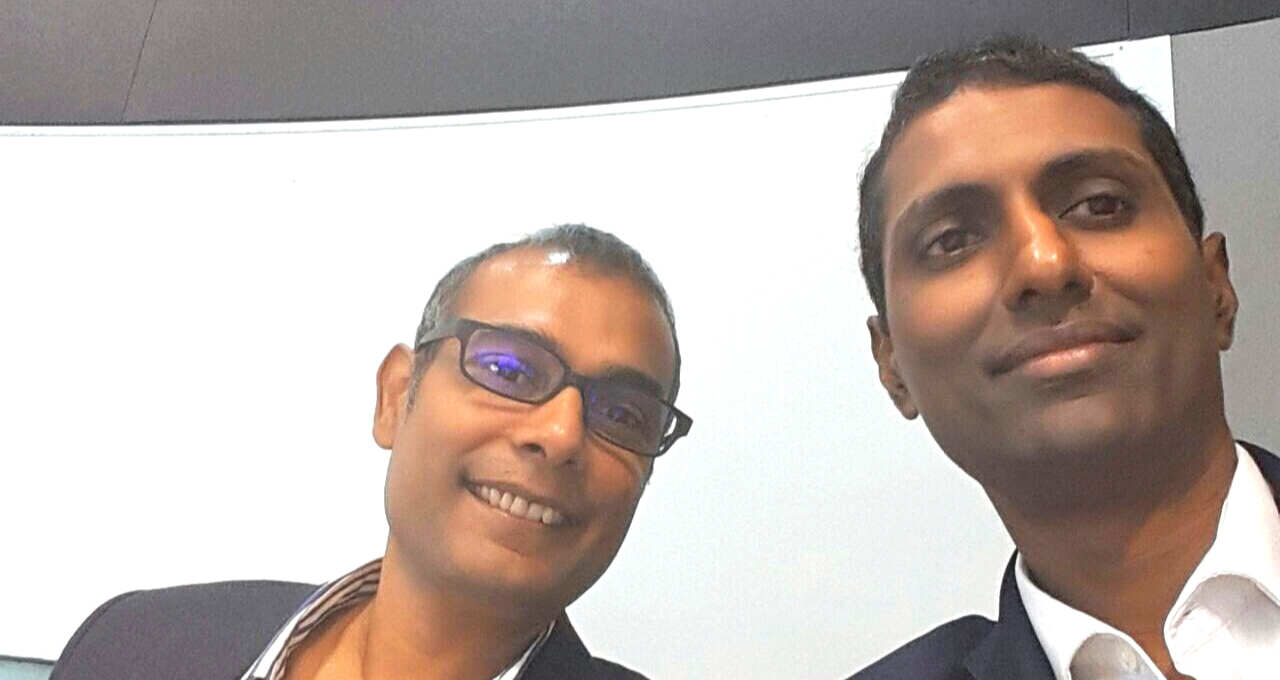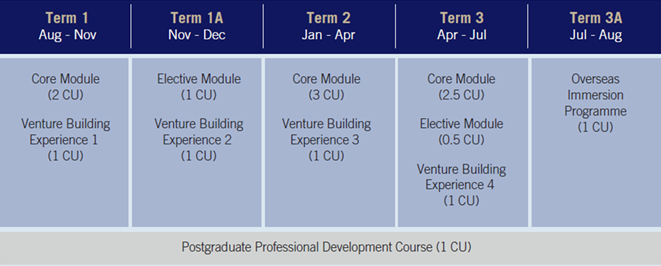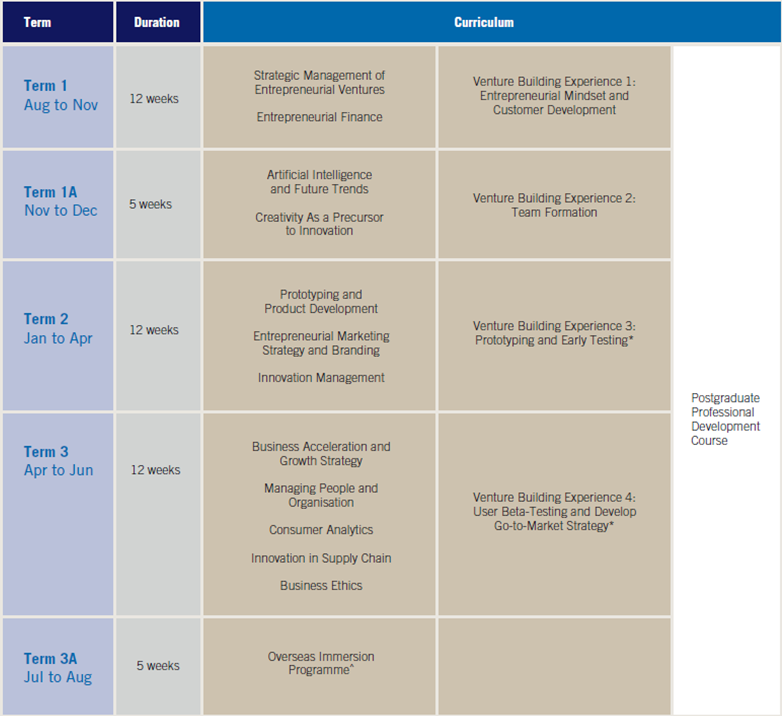How innovation can improve the lives of low-wage ASEAN gig workers







Associate Professor of Strategic Management
Academic Director, Master of Science in Innovation

Associate Professor of Organisational Behaviour & Human Resources
Academic Director, Master of Human Capital Leadership

Lee Kong Chian Professor of Operations Management
Deputy Dean (Programmes)
Academic Director, PhD in Business (General Management)
The Master of Science in Entrepreneurship and Innovation aims to equip students with a good conceptual understanding of the principles and action steps of effective innovation management in business and society, including entrepreneurship, the creative arts, science and technology, social enterprises, etc.
The programme prepares graduates to identify opportunities for growth and to solve real-world challenges.
In particular, the programme enables graduates to focus on the entrepreneurial experience through a hands-on Venture Building Experience, working with our network of industry leaders and partners.
Think beyond current paradigms in order to discover innovation needs and to envision impact through strategic idea and concept development
Turn innovation concepts into tangible new products, services, processes and business cases
Manage commercialisation challenges and market launch with confidence
Apply knowledge to accelerate growth and create sustainable value through appropriate business development, risk management, financing and value extraction strategies
This course introduces students to the theoretical concepts and analytical tools required for formulating and implementing appropriate strategies that affect the enduring success of the entire organisation. Topics covered include external and internal environmental analyses, business-level strategioes, corporate-level strategies, strategy process and implementation, and special topics such as competitive dynamics and competition in high tech industries. This course emphasises the application of theory to a number of real world strategic issues. Students are encouraged to synthesise knowledge from other business courses into a comprehensive understanding of firms’ competitive advantages.
The Ethics portion of the course is designed to explore, inform, and stimulate thinking on issues related to behavioural ethics and responsibility as encountered in the corporate world. To create this intellectual exchange, this course will focus on how individual and organizational behaviour is shaped by context as well as by biases, why these factors make it difficult for managers to be responsible leaders, and what can be done about the influence of these factors. It is important to emphasize that the goal of this course is not the ethical or moral transformation of students but to develop a set of tools and frameworks (where possible) that allow us to manage effectively in a world increasingly characterized by stakeholders with competing needs and responsibilities.
Any successful business progresses through a life cycle – from a start-up all the way to being a successful and mature firm. Growth firms often find financing one of the biggest hindrances to survival and growth. As such, an entrepreneur will often be confronted with the challenges of financing the firm to achieve growth and profitability objectives. Each financing choice has their own pros and cons that may create additional opportunities or risks for the business venture. Hence, understanding the choices available at each stage of the life cycle will be critical for the entrepreneur to chart the firm’s future.
This VBE 1 course focuses on developing an entrepreneurial mindset that is applicable not only in starting a company but also in pursuing a wide range of opportunities. The mindset includes understanding the need for determination as well as conserving resources to increase their start-ups’ survival rate at this early stage. In this course, students will also have hands-on experience in probing for customers’ needs.
This course curates the latest trend in technology that students need to be aware of in their entrepreneurial and innovation journey. Given the plethora of information out there, this course curates key information that students can use as a starting guide. Specifically, students will learn about Artificial Intelligence, Digital Transformation and other emerging technologies.
This VBE 2 course exposes students with key instructions in team formation. Students are not only given the opportunity to form and re-form their teams but also learn key points on how to build an effective and efficient team with hands-on application to their start-ups.
This course introduces the theory and practical elements of product development and prototyping. It is structured to provide a practical knowledge and deeper understanding of how product development takes place within new ventures and established enterprises. Covering both product and service development, across physical and digital domains, the course covers the strategies, tools and methods to identify customer’s needs, ideate, design, prototype, test and validate new value propositions. The structure of the course follows the typical product development pathway from Problem-Market to Product-Market Fit.
This course introduces students to the fundamentals of marketing for entrepreneurs to prepare them to develop an integrated marketing strategy in the digital age. To prepare the students with the skill set to design, implement, and monitor their marketing plans, they will use an experiential learning approach to understand and practise the basics of entrepreneurial marketing.
Necessity is the mother of invention. One reason for firms to innovate is the necessity to re-invent themselves and get out of stagnation: the industry has either gotten obsolete, or competitors have adopted newer and more efficient business models, and products or services based on more advanced technologies. Innovation is then a necessity as the firm has to innovate or perish. This course should be of particular interest to people aspiring for a career in designing and managing for innovation, either directly (e.g., V.P. of R&D, R&D Manager) or indirectly (e.g., management consulting). The course will also be useful to SME proprietors and entrepreneurs who intend to serve new markets, or use new technologies, or participants who wish to strategically reposition their offerings in an existing market.
The VBE 3 course focuses on market validation of a potentially scalable business idea and early prototyping. Students will have hands-on experience to start prototyping their products and turn their dreams into reality. Students will be guided by industry experts to in this process.
Business Acceleration and Growth Strategy Course Unit: 1 Course Description: This module introduces students to core concepts in business acceleration and how these translate to growth in entrepreneurial ventures. We systematically explore how firms grow their business and the challenges they face in doing so. The course includes components from across multiple disciplines of strategy, marketing, finance and human resources to solve daily challenges of growth. This course is designed to help rethink the tenets of core strategy in an entrepreneurial way. We start the course by discussing what growth is. We examine how companies have embarked on their growth stories and the routes they have chosen. Next, we take a deep dive into business models. What are business models and what makes for a good one? Specifically, we consider what makes a business model scalable by adopting the RTVN (Resources, Transactions, Values, and Narratives) framework. In the second half of the course, we integrate diverse disciplines, considering the roles of human and social capital, governance and operations management and internationalisation in business growth. We conclude with a discussion on sustainability and the new technologies that are driving business innovation.
Some will say that people is everything. In this course, students will learn how to manage and lead people and organizations. Critical issues like motivation and leadership techniques will be discussed and explored. Students will come out better prepared to manage what has been argued as the most critical resource in a start-up: its people.
Consumer Analytics involves designing, collecting, analyzing and presenting data-driven decisions using various approaches like statistical models, data mining techniques, simulations and tools. Organizations and business managers are increasingly utilizing data to assess the return on their investments, better understand their customers and improve their decision-making. Availability of large amounts of data, both structured and unstructured, has further increased the need to understand and extract all the relevant information from these data. In this course, we will start from the basic idea about what is consumer and business analytics. We will delve into different types of analytics like descriptive, predictive and prescriptive analytics, different types of data, structured and unstructured, and different types of analysis and tools. As such, we will use developments in statistical science to examine solutions to important issues faced in consumer analytics. There will be various cases and readings provided and used in the class to demonstrate the importance of data-driven decision making. Specifically, we will discuss regression, measuring online impact, conducting field experiments, and new product and innovation related analytics. The main emphasis of this course is on understanding, interpreting and proper use of various research techniques and providing students with important quantitative acumen for appreciating consumer analytics.
A supply chain comprises firms, organizations, and individuals, linked through physical (material), information and financial flows, and whose activities enable products and services to be created and reach the consumers. In the last few decades, logistics and supply chain executives have reoriented their focus beyond the traditional logistics issues towards the development of integrated risk management approaches to handle the multiplicity and magnitude of risk factors in global supply chains. These risk factors include disruptions arising from natural and man-made disasters (e.g., (Covid-19 pandemic, 2011 Japanese earthquake and Thailand floods), technological innovations (e.g., blockchain, AI, IoT, and robotics), regulations (e.g., carbon tax and ESG requirements), fast-changing customer preferences (e.g., ethical and environmental concerns), tight financial credit environments (e.g., 2008 financial crisis), unsustainable business practices (e.g., labor malpractices), and fluctuating exchange rates and commodity prices. Building a functional supply chain requires careful planning and consideration of a variety of risks, and it is of paramount importance to integrate management of physical flows, information and financial flows in dealing with such risks. All logistics and supply chain organizations that effectively manage their supply chain risks enjoy a level of robustness (being able to perform effectively across a wide range of supply and demand scenarios) and resilience (being able to bounce back quickly from disruptions) that leads to unprecedented levels of operational excellence with all competitive advantages. The objective of this course is to provide a thinking framework, the tools, and a portfolio of proven strategies managing supply chain risks for robust and resilient chains and discuss the implications for innovation.
The VBE 4 course focuses on beta testing and launching of initial products and services to the market. Students will have hands-on experience to gain feedback of their early versions of their products and start penetrating the market and acquire early users. Students will be guided by industry experts to in this process.
Students will be given the opportunity to travel overseas and build network and connection beyond Singapore. This trip also allows students to learn from success stories and specific lessons that an overseas environment can more uniquely offer. Such an experience is important to widen social network for subsequent venture building such as fund raising and creating distribution channels.

*Class schedule may be subject to changes


Academic Director, MSc in Entrepreneurship & Innovation
Lee Kong Chian School of Business
Singapore Management University
Embrace an educational ecosystem where you pursue your entrepreneurial dreams and innovate. Together, we can co-create the most transformative year of your life!
SMU's enhanced offering of the Master of Science in Entrepreneurship and Innovation (MEI) programme by coursework is the first Specialised Masters programme in Singapore to integrate both entrepreneurship and innovation. The importance of entrepreneurship to the economy in driving growth and development, promoting innovation, job creation and social change, cannot be underestimated. This enhanced programme delivers a relevant curriculum and innovative pedagogy critical to address the need for innovation and entrepreneurial talent in Singapore and beyond.
The MEI offers a cross-disciplined, practical entrepreneurship and innovation education delivered through world-class faculty, regular engagement with thought-leading practitioners, and a hands-on "venture building experience".
Candidates can complete the programme on a full-time basis over 12 months, through coursework and a concurrent Venture Building Experience, where they can either choose to pursue a business idea from "0 to 1" or "1 to infinity", working with mentors and/or industry partners such as Temasek Life Accelerator.
They will have the opportunity to understand the global economy, through overseas exchanges with partner institutions and overseas immersion programmes.
The MEI programme is designed to ensure that candidates acquire entrepreneurial abilities and experience, crucial to successfully tackling today's and tomorrow's innovation challenges across industries and functions. It is designed to engage, challenge and grow Asia's next generation of business and entrepreneurial leaders.
Join us if you are passionate about new value creation in business and society.